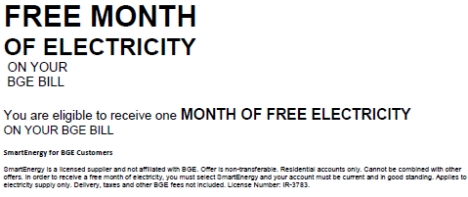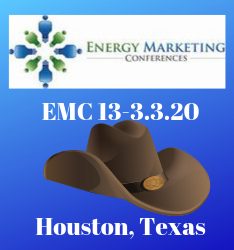|
|
|
|
|
PSC Staff Seeks Revocation Of Retail Supplier License, $500,000 Fine
The following story is brought free of charge to readers by EC Infosystems, the exclusive EDI provider of EnergyChoiceMatters.com
Staff of the Maryland PSC have recommended revocation of the electric supplier license of SmartEnergy Holdings d/b/a SmartEnergy and a civil penalty in the amount of $500,000, in testimony in a PSC complaint proceeding concerning SmartEnergy and alleged marketing violations
See background on the complaint proceeding here
Staff's testimony is notable because, while Staff had previously asked the PSC to issue an order to show cause to SmartEnergy as to why its license shouldn't be revoked, Staff had not previously recommended license revocation thus far in the proceeding
SmartEnergy issued the following statement concerning the matter: "SmartEnergy takes matters such as these very seriously. After review of the testimony, we do not agree with a number of the allegations made. That said, we very much appreciate the work done by the Maryland Public Service Commission. We have and will continue to cooperate with the Commission to resolve their concerns. Our common goal is the satisfaction of Maryland consumers through the provision of professional services and renewable energy."
Of most note in the proceeding is the applicability of the Maryland Telephone Solicitations Act (MTSA), which, as previously reported, requires a wet signature for telephonic enrollments unless one of of the statutorily enumerated exemptions is met.
One exemption of note is that the MTSA wet signature requirement does not apply to a sale, "In which the consumer purchases goods or services pursuant to an examination of a television, radio, or print advertisement or a sample, brochure, catalogue, or other mailing material of the merchant that contains: (i) The name, address, and telephone number of the merchant; (ii) A description of the goods or services being sold; and (iii) Any limitations or restrictions that apply to the offer."
The MTSA wet signature requirement also does not apply to a sale in which the seller has a preexisting business relationship with the consumer.
As alleged by PSC Staff and OPC, SmartEnergy used a postcard to market to customers, then enrolled customers responding to such postcard via inbound call over the phone without a wet signature
A witness for PSC Staff said in testimony that, "I do not believe that
sending a post card to customers meets the definition of a 'previous business
relationship.'"
A witness for PSC Staff further alleged that even if the relevant contracts were not subject to the MTSA, they are subject to the
provisions of COMAR 20.53.07.08C which states, "If a supplier solicitation is in
writing or a supplier contract is provided in response to documents submitted
upon personal contact, a signed contract is required." [emphasis added]
"As these contracts were a
customer response to written material sent by SmartEnergy, they would still
require a written signature," PSC Staff alleged
Staff did not address the MTSA wet signature exemption related to a customer reviewing mailing material, but OPC did in separately filed testimony
OPC alleges, citing a data response that, "SmartEnergy has never obtained a wet signature from any consumer it enrolled."
OPC alleges that SmartEnergy uses direct mailing material sent to the consumer’s residential address, with such mailing material appearing to have been approximately the size of a postcard (referred to hereafter as 'postcards').
According to OPC, SmartEnergy has asserted that its telephone solicitations are
not subject to the MTSA because it does not rely on outbound calls, but that, if they
are, they fall under the exemption set forth in § 14-2202(a)(5).
OPC said that this exemption applies to a transaction in which the consumer purchases goods or services pursuant to an examination of a television, radio, or print advertisement
or a sample, brochure, catalogue, or other mailing material of the merchant that contains (i) The name, address, and telephone number of the merchant; (ii) A description of the goods or services being sold; and (iii) Any limitations or restrictions that apply to the offer.
OPC alleged that the postcard does not qualify for this exemption because the postcard does not include "a description of the goods or services being sold" or the disclosure of "any limitations or restrictions that apply to the offer"
OPC provided an example of the postcard content and relative font size (e.g. font size in relation to other text on the card, the image below is not a 1:1 scale reproduction) as follows:
OPC alleged "First of all, on the postcard, SmartEnergy goes out of its way to appear not to be
selling anything, when, in fact, it is seeking to sign up consumers for retail electric supply. The emphasis of the postcard is definitely on the 'eligibility' to receive a 'free
month.' The description of SmartEnergy’s fixed price offer is secondary, and it is not
clear from the postcard that the free month is contingent on a consumer’s participating in
the six-month plan (and remaining a SmartEnergy customer for at least one additional
month). There is no disclosure of any actual fixed rate for electricity supply, which is
certainly an important part of the description and also no disclosure that the customer will
be converted to a variable rate after six months."
"[T]he timing of the 'free month' prominently
advertised on the postcards – a highly relevant limitation/restriction – is not disclosed on
any of the postcards," OPC alleged
OPC further alleged that MTSA applies to inbound calls, contrary to assertions by SmartEnergy
Apart from the MTSA issues, OPC alleged that the postcard referenced above is misleading.
"First and foremost, there is the representation that a call to SmartEnergy
will result in the consumer receiving a free month of electricity. The 'free electricity' is
promoted in large font and boldface type; it typically appears many times on the postcard ... but none of the following facts about the 'free month' is
disclosed: That it is electric supply only, not the full amount of the consumer’s electric bill; That the 'free month' is contingent on the consumer purchasing electric
supply from the supplier, SmartEnergy, rather than from the utility;
That the 'free month' is not credited to the consumer’s utility bill but rather
involves reimbursement of supply charges;
That the 'free month' is based on the consumer’s 7th month of SmartEnergy
retail supply and is reimbursed only after the consumer mails (or faxes) in a
form (provided with the Welcome Kit), along with a copy of the 7th month
bill (which the consumer would receive only after the 8th month of service had
commenced)," OPC alleged
OPC also alleged that is it likely that a consumer could be deceived into believing that the
offer originated with the utility
"On the various postcards, the utility’s name always appears
significantly more frequently than SmartEnergy’s. On some of the postcards, the return
address is stated as 'SmartEnergy for BGE customers;' on other postcards, the non14
addressed side of the postcard has 'SmartEnergy for BGE customers' in the upper
lefthand corner (in a location similar to where a return address would appear.
SmartEnergy also provided a local address, which was in the area of Maryland served by
the utility (e.g., Baltimore for BG&E). This coupling of the utility’s name with
SmartEnergy’s would tend to mislead a consumer into thinking that the offer came from
the utility or, at a minimum, that there was a utility-sanctioned connection," OPC alleged
OPC also alleged various violations by SmartEnergy in specific calls with customers.
As an example, OPC alleged that a SmartEnergy, "[r]epresentative says that price protection is for the
upcoming months because 'the rates tend to go crazy high.'"
"There was no factual basis for this hypothetical; its sole purpose is to create a baseless concern. The use of the hyperbolic description 'crazy high' is
particularly egregious. SOS rates for BG&E were known for the entire interval that [customer's]
'price protection' rate would be in effect and were known to be lower than the SE rate
($0.0927) at all relevant times. Moreover, the known BGE rate during that time was set to
decrease twice during the 6-month period (it was $0.08218 in the month of
SmartEnergy’s call but decreased to $0.08068 for months 1 through 4 and again to
7 $0.07642 for months 5 and 6)," OPC alleged
OPC also alleged that SmartEnergy was offering fixed rates as price protection for terms during which the utility SOS rate (typically meaning base energy) was already established, and that SmartEnergy's rates, which were in excess of such SOS rates, did not offer protection
"There was not a single instance in which the 'protected' rate offered to the consumer was
less than the utility’s current rate for the month in which the sales call occurred or in any
one of the six subsequent months. Again, these rates were fully knowable by
SmartEnergy at the time of its sales contacts. Simply put, when the representatives were
doing their best to attract consumers with a promise of a fixed rate, SmartEnergy could
easily have confirmed that the rate SmartEnergy was offering consumers would never be
equal to or less than what the consumer would pay by staying on the utility’s published standard offer service rate," OPC alleged
Case 9613
ADVERTISEMENT Copyright 2010-20 Energy Choice Matters. If you wish to share this story, please
email or post the website link; unauthorized copying, retransmission, or republication
prohibited.
Staff, OPC Allege Postcard Mailing Does Not Exempt Supplier From Wet Signature Requirement For Telephonic Enrollments
Staff Says 'Signed Contract' Required For Direct Mail Marketing, Citing COMAR's "Written Material" Language
February 3, 2020
Email This Story
Copyright 2010-20 EnergyChoiceMatters.com
Reporting by Paul Ring • ring@energychoicematters.com

NEW Jobs on RetailEnergyJobs.com:
• NEW! -- Senior Consultant - Competitive Energy Markets -- Houston
• NEW! -- Channel Relations Manger -- Retail Supplier
• NEW! -- Customer Service Representative -- Retail Supplier
• NEW! -- Renewables and Energy Trader -- Retail Supplier
|
|
|
|










